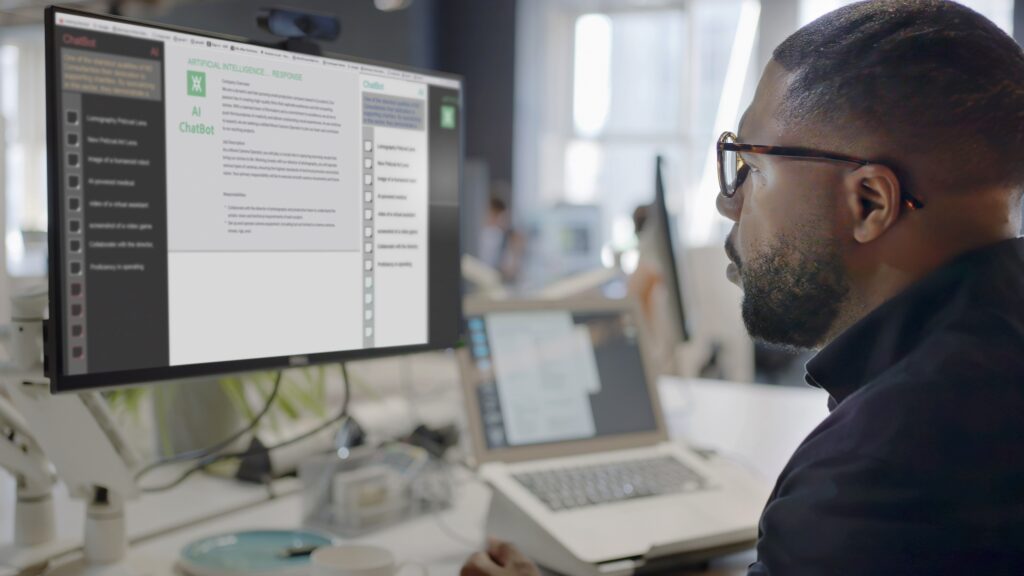AI for Enhancement, Not Replacement

In the symphony of leadership, imagine yourself as the seasoned conductor, wielding your baton with finesse and authority. Now, picture AI as the masterful violinist, seamlessly weaving intricate melodies into the fabric of your vision. The two are working in harmony — not against one another.
To most of us, the idea of AI’s impact on the future of work is daunting and anxiety-provoking. We’re afraid of losing our jobs and the very essence of human creativity. But embracing AI as an enhancement tool could be the unexpected path to adapting and thriving in the future.
We recently interviewed Ben Pring, a prominent IT futurist, on our podcast, “The Frustrated CEO.” He discussed how people in the workforce are losing their jobs to AI users rather than directly to the software itself. So, to protect the livelihoods of your hard-working employees and bring your organization up-to-speed on all thing’s artificial intelligence, we’ve compiled key insights from our conversation along with a hint of our expert advice on navigating this transformative landscape.
Find Power in Understanding
We’re all afraid of something. But, with AI, the fear of the unknown can simply scramble our brains. As a leader integrating this new technology into the workplace, your team might have mixed feelings of relief and concern. Whether they’re worried about their careers, an intelligence takeover or ending up like the characters in WALL-E, the more they learn, the less they’ll fear.
Think about the best way to engage your employees. This industry is a whirlwind of change, moving a mile a minute. Workshops, courses, webinars and conferences are an essential place to start. But first, you have to embrace a transparent approach to what this actually means. They’ll probably want answers to questions like “Why are we integrating AI? How is it being utilized? What’s the end goal, and how does it impact my role?”
Elevate Performance
Ah, those dreaded tasks. You know. The ones that lurk at the bottom of our to-do lists, like vegetables we push around our plates hoping they’ll magically disappear. Well, what if I told you these tasks could be completed on your behalf? Leaders should always be thinking about expanding their current skills. AI possesses the capabilities to turn those loathed, routine tasks into an automated solution — freeing up time for more fulfilling work.
For instance, mundane tasks such as responding to emails and scheduling appointments are vital, yet there are prompts, templates and calendar automation tools available to streamline these processes. If you’re juggling the budgets, tasks and timelines of a project, AI can step in to manage it so you can focus on execution.
The opportunities are endless but not yet perfect. So, don’t forget to add a hint of personalized charm and double-check everything that leaves your desk.
Overcome Procrastination
Procrastinate much? As we acknowledged above, we’re all susceptible to slipping into patterns of procrastination — it acts as a thief of time, silently robbing us of precious moments until we’re left pondering where they’ve all gone. At times, we require a little extra support to get over the hurdle because once we initiate momentum, we propel forward with vigor. And while AI can’t conquer everything, it can give your team the nudge they need to get the ball rolling.
Research is always the guiding light in setting a strategy. Luckily, language-based AI interfaces are increasingly proving themselves to be as effective as and faster than your traditional search engine. Your team can even brainstorm or start a draft. As always, be sure to check everything twice. Just like the rest of the internet, you can’t believe everything you see, and experts can tell when content is solely crafted by AI. Remember, it’s a spot to begin — human talent has to bring it home.
To listen to Ben Pring’s episode of “The Frustrated CEO,” you can find the recording here. Prefer to see our expertise in action? Watch the video on our YouTube channel.